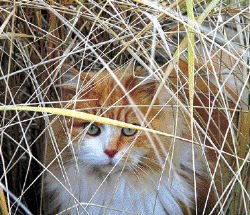A Photographer Captures the Beauty of the Feral Cats That a New Jersey Coastal Town Is Hellbent Upon Exterminating

Another authority has come forward to refute the often repeated lie that feral cats are sickly, spread dangerous diseases, and lead such miserable existences that they would be far better off if they were exterminated. Little Silver, New Jersey resident David Tanen, who spent considerable time photographing the cats who live on the beach in nearby Sea Bright, found them to be both hardy and healthy.
"I've learned how clever and resilient they are," he told The Hub of Freehold on September 7th. (See "Beach Cats Star in Sea Bright Exhibit.") "The town was going after them, yet I recognize the offspring of some of these cats. They're so healthy."
Not merely content with capturing the cats' images for posterity, Tanen decided to use his photography to help the cats in Sea Bright and elsewhere. The first product of his newfound commitment was a calendar comprised of his photographs and entitled "Beach Cats, Wild Cats of Sea Bright 2006."
So far, five-hundred or so of the more than one-thousand calendars that he had printed have been sold with the proceeds going to the Monmouth County SPCA and Alley Cat Allies. Between $3,000-4,000 has been taken in to date.
The photograph at the top of the page is entitled, appropriately enough, "Winter Cat," while the one in the middle of the page is titled "Grasskit." The photo at the bottom of the page is titled simply "Cavel." The entire collection is on exhibit at the public library in Sea Bright through the end of the month.
Explaining how be became interested in the cats, Tanen told The Hub, "I just happened upon them and thought, 'They're so pretty.' The variety is what fed my interest and that they're so fancy. So I started taking pictures."
Tanen's work, no matter how inspiring, cannot disguise the horrific crimes that the politicians and citizens of affluent Sea Bright have perpetrated against their felines residents over the years. Sadly, many of the cats captured on film by Tanen may have already been exterminated.
For at least two years and probably longer, Sea Bright has been trapping and giving them to Blumig Kennels in East Brunswick to exterminate. (See The Hub, August 13, 2004, "Crackdown Coming on Feeding Feral Cats. Borough Hopes to Shed Image of Welcoming Felines.") It has also criminalized feeding them and a city ordinance requires that all felines be licensed and wear collars with tags when out-of-doors.
The extermination campaign has been spearheaded by fanatical cat-haters Natalie Hutchinson, a local homeowner, and borough councilwoman Dina Long who have waged a malicious slander campaign against the cats by alleging that they spread diseases and foul yards and the beach with their feces. Hutchinson has even gone so far as to raise the specter of lawsuits against the city if the cats are not eradicated.

Typically, Hutchinson and Long blame outsiders for not only dumping the cats at the shore but for enabling them to survive by feeding them. It would thus appear that the wealthy residents of Sea Bright do not have either an ounce of humanity or a penny's worth of generosity to offer their feline residents.
As per usual, wildlife officials have also joined the bandwagon by labeling the cats as a threat to the piping plovers who nest on the beach. Health officials from Monmouth County have also been called upon to provide a rationale for the town's extermination plan.
Sleeping rough is obviously not an ideal situation for the cats; they all need loving homes. Nonetheless, like all creatures, homeless cats have an inalienable right to life and freedom. Killing or harming them in any way is a grievous offense against both nature and God. By exterminating their homeless cats, the residents of Sea Bright have proven themselves to be far more morally bankrupt than either Adolf Hitler or Pol Pot!
It is surprising that Alley Cat Allies and other feline advocacy groups have not stepped in to protect the cats and to refute Hutchinson's and Long's malicious lies. Contrary to the unfounded assertions of this pair of ailurophobes, there is a growing body of veterinary evidence that supports the conclusion that most feral cats are healthy and lead relatively good lives if they are left alone.
In some instance, trapping and sterilization may be necessary in order not only to keep their population in check but, more importantly, to placate the demands of cat-hating monsters such as Hutchinson and Long. Generally, however, feline overpopulation is exaggerated because less than twenty per cent of homeless kittens survive.
Researchers are currently working on the development of a feline birth control pill which will hopefully greatly reduce the need for trapping and sterilization. This is a welcomed advancement because sterilization is not only expensive but trapping is traumatic for cats and complications sometimes arise from these types of surgeries.
Although a lack of food and shelter are formidable obstacles for all feral cats to overcome, their main threat comes from ailurophobes, both those who operate within the confines of the law and those who act outside it. Extermination is the only arrow in the quivers of most animal control officers and so-called humane societies and they are not the least bit hesitant to do the burgers' and politicians' dirty work for them; besides, they get a kick out of killing defenseless cats and dogs.
Inveterate cats haters, on the other hand, look upon cats as fair game for any cruelty. Some of these monsters poison them with antifreeze and other toxins while others shoot and torture them with impunity.

The residents of Sea Bright need to change their way of thinking and join the twenty-first century. This requires first and foremost that they renounce extermination as method of dealing with their feral cats.
The cats need police protection, food, water, vitamins, shelter, and veterinary care and it is incumbent upon the politicians and residents of Sea Bright to provide these essentials. If Sea Bright refuses to mend its evil ways, Alley Cat Allies and other cat advocacy groups should seek injunctive relief in the courts in order to protect the cats. The same rationale applies to food and shelter. If Sea Bright persists in its niggardly ways, it is paramount that Alley Cat Allies step in and provide what is needed.
Flooding caused by n'oreasters is also a major concern. The city should provide the cats with a safe and dry place to hold up when the Atlantic crosses the seawall and floods not only the beach but Route 36 as well.
If the residents of Sea Bright had either any humanity or intelligence they would realize just how lucky they are to have such beautiful feline residents. Far from being a liability, they are big positive for the city.
Photos: David Tanen.

<< Home